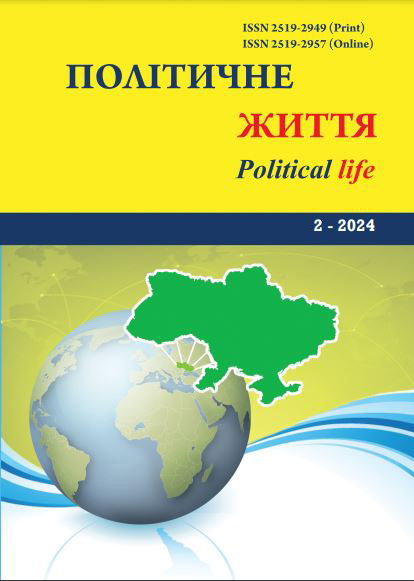Neo-institutional approach to the study of certain informal limitations of local government in Ukraine
DOI:
https://doi.org/10.31558/2519-2949.2024.2.10Keywords:
neo-institutional approach, local self-government bodies, local government, formal restrictions, informal restrictions (institutions), destructive informal institutions, corruption, corruption risksAbstract
The article analyzes the features of the application of D. North’s neo-institutional approach to the study of local government in Ukraine, focusing on informal institutions and corruption. It was noted that the topic of formal and informal institutional restrictions is extremely important for the functioning of local authorities in Ukraine, since these restrictions determine the rules and order of interaction between various organizations and power structures at the local level. The essential characteristics of "informal" politics are determined (informal politics is dominated by private, interpersonal relations, which have priority over formalized and normatively regulated aspects of its functioning and implementation). It is noted that informal institutions are characterized by ambivalence. On the one hand, non-publicity and informality can restrain the development of formal institutions. On the other hand, they have a functional meaning, because thanks to informal connections and procedures, participants in the political process can make decisions more easily and quickly, bypassing bureaucratic obstacles. Corruption is considered as one of the most widespread "destructive" informal institutions of local government in Ukraine. It has been proven that such an informal institution of local government as corruption determines the behavior of government officials where formal rules are absent or can be circumvented. The analysis of corruption risks using D. North’s neo-institutional approach shows that corruption as an informal institution is permeated with several more destructive informal restrictions, such as favoritism, biased activities of representatives of local authorities and lobbying. The analysis of corruption as an informal institution in the exercise of local power shows the ineffectiveness of formal institutions and the significant destructive impact of corruption on local government.
References
Бондаренко О. С. Корупційні ризики в діяльності органів місцевого самоврядування: сутність, прояви та заходи протидії. Академічні візії. 2023. № 16. http://dx.doi.org/10.5281/zenodo.10334783 (дата звернення: 26.04.2024).
Була С. Неоінституційні механізми реалізації детермінант локальної демократії в Україні. Освіта регіону. 2012. № 2. URL: https://social-science.uu.edu.ua/article/794 (дата звернення: 24.04.2024).
Гапоненко В. Неоінституціоналізм як метод дослідження демократизації політичної системи України. European Political And Law Discourse. 2019. Vol. 6. Iss. 4. P. 38-43.
Корупційні ризики. НАЗК. 2023. URL: https://antycorportal.nazk.gov.ua/risks/catalog/?search= &organ_owner_id=152&f1=1&page=8 (дата звернення: 20.04.2024).
Кушнарьов І. В. Неоінституціоналізм як методологічна підвалина вивчення неформальних інститутів: приклад політичної корупції. Політикус. 2017. № 5. С. 16-20.
Рибій О.В. Процеси трансформації політичних інститутів: етапи та рушії : автореф. дис. ... канд. політ. наук : 23.00.01. Київ : ІПіЕНД ім. І. Ф. Кураса, 2011. 15 с.
Шевченко Т. В. Сутнісні характеристики та ознаки неформальної політики. Магістеріум : Політичні студії. 2016. Т. 64. С. 14-19. URL: https://ekmair.ukma.edu.ua/handle/123456789/9799 (дата звернення: 26.04.2024).
Anghel V. Rule of Law or Rule of Norms? Informal Institutions and their Role for Democratic Resilience. Von Forum Transregionale Studien. 27.02.2024. URL: https://trafo.hypotheses.org/50569 (дата звернення: 26.04.2024).
North D. S. Institutions, Institutional Change and Economic Performance. Washington University, 1990. 152 p. URL: https://doi.org/10.1017/CBO9780511808678 (дата звернення: 26.04.2024).

